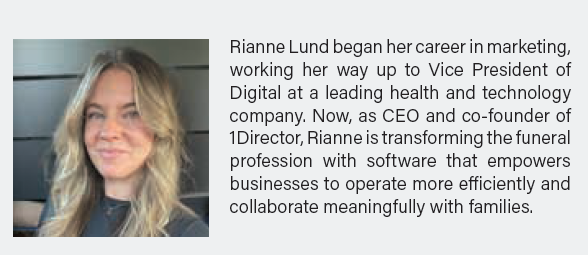(404) 312-6640
5 Technology Trends Shaping the Funeral Industry in 2025
When you think of innovation and cutting-edge tools, the funeral industry might not be the first thing that comes to mind. This is an industry steeped in tradition, where personal connection, empathy, and timeless rituals form the foundation of its services. However, as society evolves and technology continues to transform nearly every aspect of our lives, funeral homes are discovering new ways to incorporate modern tools without compromising their core mission. Here are five technology trends that might make you rethink how you offer services. Some are practical, some bring peace of mind, and some may surprise you!
1. SEAMLESS CASE MANAGEMENT: KEEPING IT ALL TOGETHER
Case management may not be the most exciting topic, but
let’s face it–you’ve been through the coordination chaos
that can happen within families around final arrangements,
and you understand why funeral homes are putting
serious stock into case management technologies. A good
case management system can guide funeral directors and
families through every step of the funeral planning process,
from pre-planning to final arrangements, without needing
to overburden families with coordinating communication.
• A COMPREHENSIVE DASHBOARD: Modern case management
tools like 1Director track and save every interaction,
document, and payment in one easy-to-navigate
system. No more frantically searching for a rogue sticky
note or long-lost email with crucial details. Instead, you
can access important information with just a few clicks,
making your job easier, while ensuring families don’t
have to repeat or keep track of details.
• WEBSITE INTEGRATION FOR MEMORIALS: Ensure your
case management software works seamlessly with your
website to publish memorial walls, obituaries, and memorial
videos with just a click of a button. This not only saves
time but also allows families to share and celebrate their
loved ones’ lives in a meaningful, accessible way.
• PRE-NEED TO POST-SERVICE COORDINATION: Case
management systems can help organize pre-plan needs,
coordinate immediate needs, and help you facilitate
care and follow-up after services. For families planning
ahead, digitally storing your pre-need cases ensures
that all their preferences and arrangements are securely
saved and accessible even years down the line. At-need
arrangements can be tracked in real-time so that services,
billing, and personal requests are taken care of
and nothing slips through the cracks.
• ON-THE-GO ACCESS: Whether you need to make lastminute
changes or check on service details, a good case
management system allows staff to log in from any
device. So even if you’re called in while sitting down
for dinner, you don’t need to sift paper files or search
for notes. This also means the families get a consistent,
reliable experience because everyone can access the
same information.
2. ENHANCED CALENDAR INTEGRATION
Forget your wall calendars and having to take photos of your
office whiteboards. Digital calendars are getting a massive
upgrade in funeral homes, becoming sophisticated tools for
tracking every single event, task, and resource allocation in
the arrangement process. Calendars now have the potential
to save your days rather than just display them.
• RESOURCE ALLOCATION: From reserving rooms to assigning
staff, calendars can act as resource managers,
ensuring the right people and places are available exactly
when needed. These calendar systems can help you
avoid accidental double-bookings and missed deadlines,
so you can focus on families instead of details.
• FAMILY AND STAFF NOTIFICATIONS: Anyone who’s been
through the funeral process knows that grief and stress
can make it easier to overlook details, so activating notifications
can be a small but meaningful comfort during
an otherwise stressful time.
3. ONLINE FAMILY COLLABORATION: BRINGING LOVED ONES TOGETHER (DIGITALLY)
Funeral planning involves many moving parts, any of
which can overwhelm families dealing with grief. Online
family collaboration tools take some of the burden off their
shoulders by creating a shared space where families and funeral
homes can stay connected, make decisions, and even
upload photos and documents.
• TASK ASSIGNMENTS FOR FAMILIES: Task tools allow
funeral directors to assign specific tasks to family members,
like gathering photos, choosing music, or selecting
stationery options. It’s like a project management board
for funeral arrangements that families can participate in
from anywhere.
• FILE SHARING AND FEEDBACK: Families can upload
photos, music files, or payment information directly to
the platform, and funeral staff can review them in real
time. Digital collaboration ensures that every detail,
from the visual tribute to the music selection, reflects
the family’s wishes and everyone feels involved.
• EASY PAYMENT AND DOCUMENT MANAGEMENT: 1Director
offers collaboration tools with secure portals so families can
handle payments, upload necessary documents, or confirm
services in one place, without making repeated trips to
the funeral home. No more hunting down checkbooks or
waiting on coordinated payments.
4. AI TOOLS: INCREASING OPTIONS WHILE KEEPING THE HUMAN TOUCH
AI is weaving its way into the funeral industry, offering
tools for everything from obituary writing to grief support.
Let’s be clear: AI in the funeral industry is a tool to enhance
services, not a replacement for human care. Think of it as a
helping hand for some of the more time-consuming tasks,
allowing your staff members to focus on the families in
front of them.
• OBITUARY WRITING MADE EASIER: Crafting the perfect
obituary can feel overwhelming and grief doesn’t make
the task easier. AI tools offer templates, suggestions,
and prompts based on family input. They give guidance
and structure so the family can focus on using their own
voices to tell their loved one’s story more confidently.
• GRIEF CHAT FEATURES: AI-powered chatbots now offer
families basic grief support at all hours of the day, sharing
comforting messages and resources. It’s a compassionate,
always-available companion for families who
may need support outside business hours.
AI may prompt some hesitancy, but it’s not here to replace
the human side of funeral services. Instead, it frees up
time for staff to focus on providing the emotional support
and experience that only humans can offer.
5. SELF-SERVICE TOOLS: EMPOWERING FUNERAL HOME STAFF
Funeral homes operate in a fast-paced environment where
agility and customization are key to delivering exceptional
service. Modern self-service tools within funeral home software
give staff the control they need to make updates, changes,
and adjustments without waiting on external support—
ensuring their operations remain seamless and efficient.
• WEBSITE UPDATES MADE SIMPLE: With intuitive
self-service tools, funeral home staff can easily update
their websites to post new obituaries, modify service
details, or share announcements. This ensures families
and the community have access to timely and accurate
information without unnecessary delays.
• ON-DEMAND GENERAL PRICE LIST (GPL) ADJUSTMENTS:
Changing GPL prices or updating service offerings no
longer needs to involve cumbersome back-and-forth
with external vendors. Self-service software allows staff
to modify pricing, descriptions, or packages directly,
helping funeral homes remain compliant and responsive
to family needs.
• CUSTOM FORMS FOR YOUR BUSINESS: Every funeral
home has unique needs, and modern software should
reflect that. Self-service tools enable staff to create and
modify form fields to suit their processes. Whether it’s
capturing specific family preferences, gathering unique
service details, or handling internal records, funeral
homes can build forms tailored to their operations—no
technical expertise required.
• DOCUMENT MANAGEMENT AT YOUR FINGERTIPS: Need
a new document template for service arrangements or
memorial programs? Self-service platforms let you create,
edit, and upload templates instantly. This ensures your team
always has access to the latest resources without delays.
At its core, software for funeral homes should be flexible
and customizable, allowing your team to work the way
that suits your business best. By empowering staff to make
changes when they need them, funeral homes can stay lean,
responsive, and in control—all while delivering exceptional
service to families in their time of need.
A LOOK TOWARD THE FUTURE
The funeral industry’s traditions are deeply rooted in
providing care and comfort during life’s most difficult moments.
But as these five technology trends show, embracing
innovation doesn’t mean abandoning those values—it
means enhancing them. By integrating tools like case management
systems, enhanced calendars, online family collaboration
platforms, and AI, funeral homes can improve
their operations, lighten the load for families, and create
even more meaningful and personalized experiences.
As we look toward 2025, it’s clear that technology will
continue to play a pivotal role in shaping how funeral services
are delivered. The key lies in adopting tools that align
with the industry’s core mission: honoring lives, supporting
families, and creating spaces for remembrance. Change can
be daunting, but it also brings opportunity—an opportunity
to better serve families and build a legacy of compassion
and care in an evolving world.
The future may surprise us, but it’s a
future worth embracing.







Comments